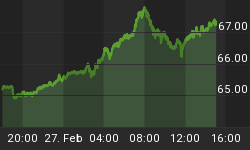It's day 33 for me. I leave the house to walk the dog and occasionally swing by the corner store. But that's about it. I haven't ridden in a car since March 20th, nor a bus or any form of transportation other than my bicycle. I'm sure I'm not alone, and it's got me thinking. How exactly has this lockdown impacted oil demand? And perhaps more importantly, will this way of life become somewhat of a new normal? Most articles mention that COVID-19 has had a devastating impact on the demand for crude oil. That much is obvious. Storage facilities across the globe are filled to the brim. The situation is so dire, in fact, that fleets of tankers are idling offshore near many of the world's largest oil hubs. We saw a preview of what this means just this week when oil prices fell to -$37 per barrel.
Because I follow these stories every day, that historic event almost felt like watching a train crash in slow motion. All of the signs were there - we all knew something bad was going to happen - though I don't think anyone imaged it would turn out quite like that.
But back to the topic at hand. Lockdown. Did you know that transportation of all sorts accounts for nearly 70 percent of oil consumption in the United States? And now, instead of sitting in traffic or jumping on the train to get to work every day, many of us just roll out of bed (shower optional) and hop on the computer.
Daily national traffic volume fell by roughly 38 percent from February 22-28th to the same days in March, and April is likely to be even more extreme. Worse still, this is the beginning of driving season, the time of year when families are supposed to hop in their car and drive out to see the great American countryside.
Now, of course, the lockdown is not the sole culprit in crude oil's demand crisis. But consider this, approximately 70 percent of each barrel of oil goes towards making fuel.
Related: The Tech Threat That Will Linger Long After COVID-19
Before, about 5 percent of Americans had the luxury of being able to work from home. Now, more than 30 percent of the country is logging in from their couch instead of pouring up a to-go coffee and rushing out the door every morning. And though this lockdown has some of us clawing at the walls, desperate to go back to the office, or at least have some change in scenery, the cat is out of the bag.
Workers and companies alike now see that it's actually possible to be productive remotely. For employers, this means savings. Cheaper offices, no more mileage checks, no more stocking up on gallons upon gallons of coffee....you get the picture. For workers, well, for most, it means one thing and one thing only: no more commute.
Across the United States, the average time workers spend on their one-way commute is 27 minutes. That's 54 minutes every day... 4.5 hours per week...19.5 hours per month...234 hours per year. It's even worse for some of the country's biggest cities. In New York City, for instance, workers spend an average of 81 minutes on their round-trip commute.
Now, I can hear some of you yelling through your monitors "MINE IS WAY WORSE." Oh, believe me, I know how shocking these averages might seem to some of you. Back in Texas, myself and tens of thousands of others were stuck on the daily commute into Dallas which, on a lucky day, would take around 50-60 minutes, but had the potential to stretch into 1.5 or two hours or more rather easily.
By the way, that's just a portion of how much time Americans actually spend in their cars. We love our cars. In fact, there's an average of 1.37 cars owned per every American adult. More than that, we love to be in our cars. The average American, pre-crisis of course, spent more than 10 hours per week in their car.
So back to my original thought, what if "when this is all over" things don't just return to what they once were? The world is grappling with a (hopefully) once-in-a-lifetime crisis, and surely it won't be that easy for many people to simply dive right back into the mix, sitting in a small box for hours upon hours every week. So where will that leave oil?
We've heard "lower for longer" oil prices before...right before they jumped back up into the $60-70 range. But what if this is the real deal? Could COVID-19 potentially be a catalyst in a series of events that leads to peak oil demand? Or will demand recover to pre-crisis levels?
More Top Reads From Safehaven.com:
















